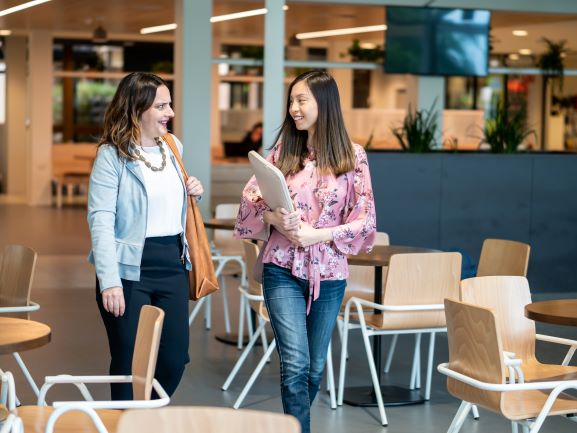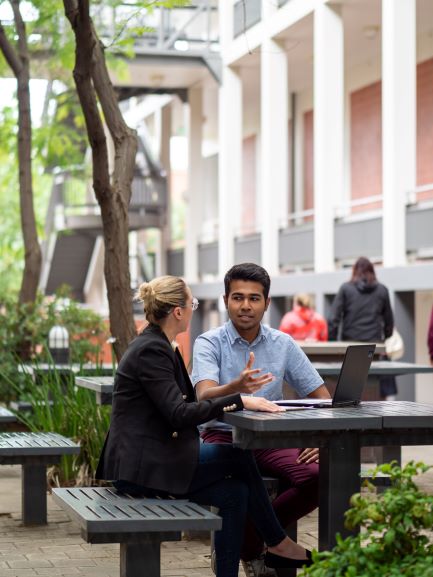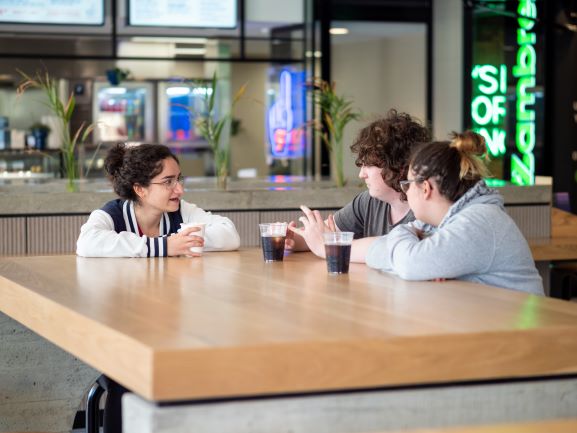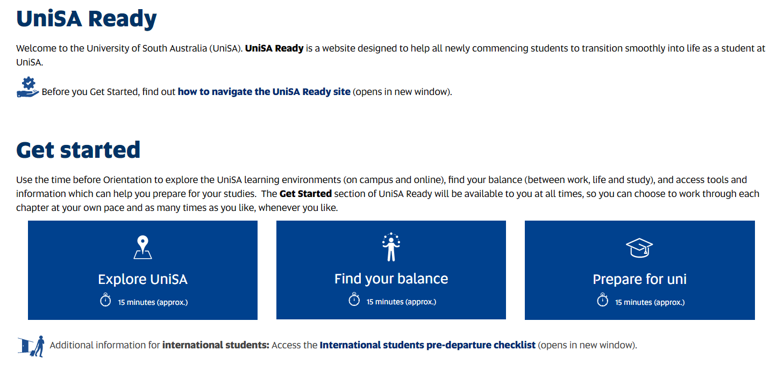VEEP Mentor online training modules
| Site: | learnonline |
| Course: | VEEP Mentors Online Training Module |
| Book: | VEEP Mentor online training modules |
| Printed by: | Guest user |
| Date: | Monday, 2 December 2024, 12:39 PM |
VEEP mentors are:
- Currently enrolled students or staff at UniSA who are a serving/ex-serving ADF personnel, First Responder or their immediate family member;
- ADF personnel who have transitioned from the ADF to a civilian career; or
- Defence or related industry personnel
who can share their knowledge and experiences, answer questions, and offer guidance and advice to UniSA VEEP program students.

Why be a VEEP student mentor?
|
Activity Look at the list of selection criteria below. Which three do you think employers consider the most important when recruiting graduates?
Answer: Click here (opens in new window or tab) |
In addition to working on your interpersonal and communication skills, as a VEEP student mentor you will have an opportunity to:
- help other students and share experiences learnt from past challenges
- develop employability skills & graduate qualities
- build a global network of friends.
-
become more involved in university life.
Additional rewards
- The VEEP mentoring program counts towards UniSA+. To find out about what this involves, check out the link here. For more information, email unisaplus@unisa.edu.au or studentleadership@unisa.edu.au.
- A Certificate of Recognition at the end of the Study Period.
-
Access to further professional development opportunities
Why be a VEEP external/industry mentor?
- Contribute to the personal and professional development of a VEEP student;
- Find reward by giving back through sharing your knowledge and expertise
- Build connections to UniSA;
- Receive a certificate of appreciation in recognition of participation in the program;
- Receive an invitation to a recognition and celebration event

VEEP mentoring program aims :
-
to assist VEEP students with the transition into and through university and to expand their network and interpersonal skills by facilitating personal and professional connections.
-
to improve the experiences of UniSA VEEP students
-
To create an inclusive UniSA VEEP community

Structure of the Program
- Online Training Modules
Mentors are encouraged to complete the online training module prior to the "kick-off' event on Tue 4th August 2020
- Make contact with your mentor
It is the mentee's responsibility to make contact with their mentor to introduce themselves once they have been advised via email of their match.
- "Kick-off event" Tuesday 4th August 2020 # Please note this event has been cancelled for SP5 20
After being matched, you will be invited to a ‘kick-off’ social event which will provide you with an opportunity to meet your mentor/mentee, as well as meeting other program participants and the program coordinators
- Mentor/mentee meeting schedule
Mentors and mentees are expected to meet 2-4 times per Study Period. This can be face-to-face or by email, phone or online. Mentees are expected to develop personal learning/development goals with their mentor before or during the first meeting and review these throughout the program.
- Wrap up event
The program will conclude with a ‘wrap-up’ event, during which participants will be able to share their experiences and receive their certificates of participation. (November date tbc)
VEEP mentors are expected to:
![]() Act in a professional, responsible and appropriate manner at all times
Act in a professional, responsible and appropriate manner at all times
![]() Respect and value diversity and the rights of all students
Respect and value diversity and the rights of all students
![]() Provide important links and social connections
Provide important links and social connections
![]() Maintain confidentiality in relation to matters discussed with the VEEP students.
Maintain confidentiality in relation to matters discussed with the VEEP students.
VEEP mentors are not expected to:
![]() spend more than 4-6 hours per study period on their duties
spend more than 4-6 hours per study period on their duties
![]() act as a student advocate
act as a student advocate
![]() deal with distressed students
deal with distressed students
VEEP mentors must not:
![]() give advice on academic matters
give advice on academic matters
![]() disclose any information gained in conversation apart from reporting concerns about a student’s welfare to their coordinator
disclose any information gained in conversation apart from reporting concerns about a student’s welfare to their coordinator
![]() speak negatively about UniSA staff members
speak negatively about UniSA staff members
As a VEEp mentor your responsibilities will be to:
- Commit to a minimum of 4-6 hrs for the designated study period
- Carry out your role in a manner which does not present a risk to yourself, others, or the environment. See the UniSA Code of Conduct for Students, information about Health and Wellbeing, and the Respect. Now. Always. campaign.
- UniSA is committed to building a culture of respect and inclusivity in which everyone can feel safe. The University takes a zero tolerance approach to sexual assault and sexual harassment and has a range of initiatives designed to strengthen the University’s culture, policies and practices.
- We encourage all VEEP mentors to make themselves familiar with the Consent Matters website and contribute to building a university culture which is safe for everyone.
- Follow any reasonable directions given by UniSA staff
- Comply with any procedure relating to OHSW & report all incidents, defects, and hazards so that appropriate corrective action can be taken (for more information see the Safety and Wellbeing page)
- Contact the VEEP mentoring program coordinator if for any reason you are unable to continue in the program
Our responsibilities will be to:
- Give you required information in advance
- Provide you with guidance, supervision, and direction
- Notify you of any matters concerning OHSW
- Provide you with feedback on your role if requested
The following sections provide further information about the support services available to UniSA students.
As a VEEP mentor, students may ask you to direct them to the appropriate UniSA services so please use this section as a guide
Student support at UniSA
UniSA has a number of services to support students throughout their studies. Check out the diagram below and find out more about each of the services here: Student services and support

USASA, the University of South Australia Students’ Association, is a democratic organisation run by students. Find out more about USASA.
In particular, USASA Advocates are available to assist students with the following:
- Requests for remarking and resubmissions
- Appeals against allegations of academic misconduct (including plagiarism)
- Appeals against final grades
- Appeals against intention to preclude
If a student issue is not listed here, an Advocate may still be able to assist. Find out more info about USASA Advocates here.
UniSA Ready
The UniReady site is filled with useful resources to help new students prepare for their time with UniSA. Students can work through the 'Get Started' section in the lead up to Orientation week. At the end of Orientation week they will then be able to access the 'Orientation Follow-up' section. Students can then visit the 'Your First 6 Weeks' section of the site.
The site can be accessed here

The ability to communicate information accurately, clearly and as intended, is vital to the role of a VEEP mentor.
Whether you are communicating face to face, via email, phone, social media, in a group or one on one there are a number of things you need to keep in mind in order to be a good communicator.
Communication tips
-
Listen
- Being a good listener is one of the best ways to be a good communicator.
- Practice active listening. Active listening involves paying close attention to what the other person is saying, asking clarifying questions, and rephrasing what the person says to ensure understanding ("So, what you're saying is.......)
- Through active listening, you can better understand what the other person is trying to say, and can respond appropriately
2. Non verbal communication
- Your body language, eye contact, hand gestures, and tone all affect the message you are trying to convey. A relaxed, open stance (arms open, legs relaxed), and a friendly tone will make you appear approachable, and will encourage others to speak openly with you.
- Eye contact is also important; you want to look the person in the eye to demonstrate that you are focused on the person and the conversation (however, be sure not to stare at the person, which can make him or her uncomfortable).
- Pay attention to other people's nonverbal signals while you are talking.
3. Clarity and Concision
- Good communication means saying just enough – don’t talk too much or too little.
- Say what you want clearly and directly, whether you're speaking to someone in person, on the phone, or via email.
- If you ramble on, your listener will either tune you out or will be unsure of exactly what you want.
Please click on links below to access forms. Once you have completed please send to : veterans@unisa.edu.au
Tips for mentors
1. Be an active listener. Get to know your mentee; what are they studying, what direction do they wish to take after completing their studies? What are their interests? What are they hoping to gain from the mentoring relationship?
2. Discuss your own own professional path and remember your failures and hardships throughout life and your career are just as valuable to your mentee as are your successes. Share your experiences and offer constructive criticism
3. Be prepared for the meetings and if rescheduling or cancelling follow the guidelines established in your first 1:1 session
4. Be approachable, available and inquisitive
5. Inspire your mentee to reach their fullest potential and challenge their comfort zone.
Tips for mentees
1. Respect you mentors time. Remember that your mentor has volunteered their time to be a part of the program. Come to each meeting with a prepared agenda & your personal development plan.
2. Be an active listener. This is a great way to build trust & establish rapport with your mentor.
3. Be prepared for the meetings and if rescheduling or cancelling follow the guidelines established in your first 1:1 session
4. Be flexible, inquisitive and willing to step out of your comfort zone.
5. Be punctual and ask questions!
If you have any questions or feedback regarding the VEEP mentoring program please contact the VEEP Project Officer at: veterans@unisa.edu.au